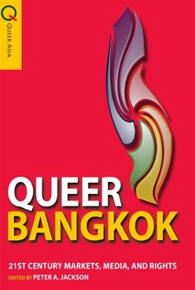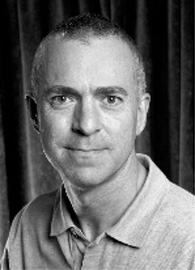Queer Bangkok: 21st Century Markets, Media and Rights
Edited by Peter A. Jackson
The Fifth Volume in the Queer Asia Series, co-published by the Hong Kong University Press and Silkworm Books of Thailand, 2011
Winner of the 2011 Ruth Benedict Book Prize


Bangkok and sex are two words that have been entwined in the popular imagination since the Victorians ‘discovered’ Siam. At its height in the sixties, the Vietnam War brought American servicemen to Thailand by the hundreds of thousand to help found its commercial sex industry. The economic boom times that have (inconsistently) enriched the East since then have long-ago widened the source of sex-tourists that came initially from Europe and America to include Asian countries like Japan, Singapore and Hong Kong. People come to Bangkok now from everywhere in the Pacific Rim. All this has served to reinforce the association of Thailand with sexual paradise. Almost everyone, even if they can’t afford to, dreams of going to Thailand to get laid.
I apologise immediately to any Thai readers and other lovers of the country if I offend by offering this crude approximation of the attractions of the country. There is, of course, very much more to Thailand than I describe; many come to Thailand for the other extraordinarily beautiful things that are found there. But what you are reading is, after all, a Fridae column, so I shall remain unashamed of confining my introductory remarks about Thailand to the area of sex. I am ashamed, though, in reading the collection of essays in Queer Bangkok, to realise how ignorant I have been up till now of almost every aspect of sex, sexuality and gender in the country. Peter Jackson and the authors he features make it plain that even the scrapings of ‘knowledge’ picked up in Bangkok’s Silom Road by farangs (foreigners) such as I fear I must be, are likely to be embarrassingly misleading. Read the collection of essays, many of them superlatively written, that Jackson has assembled here and see if your understanding has been any better than mine!
Jackson is a member of the Editorial Collective behind the ground-breaking Queer Asia series published by Hong Kong University Press, of which this book is the fifth (this one uniquely published jointly with Silkworm Books of Thailand; apologies are due here to the Press as our recent review of Falling Into the Lesbi World wrongly credited that volume – actually the sixth – with being fifth in the series). Jackson is a Professor at the Australian National University and a recognised expert on Thailand; he was one of the organisers of the 1st International Conference of Asian LGBT Studies in Bangkok in 2005, which this reviewer was lucky enough to attend. He is also a fine writer: clear, succinct, incisive and free of the mind-numbing jargon that disfigures the writings of so many queer theorists (one has to hope his example will be at least one foreign habit Asian queer studies will copy!).
In this new collection, Jackson has brought together experts from many fields to piece together a picture of how Thailand’s politics, economics, art, society and views of sex affect the LGBT people who actually live there as opposed to just pass through. The book is organised in three parts: a review of markets and media in Bangkok’s queer cultural transformations; a look at Bangkok’s place in global and regional developments; and analyses of LGBT activism and its achievements (and failings) in modern Thailand.
The picture that emerges from this collection is surprising and thought provoking. A background point that neither Jackson nor his contributors have need to labour is just how different the Thai approach to sexuality and gender is. The Queer Asia series has long ago made it quite plain that approaches to sexuality and gender are culturally specific, in many cases miles removed from European or American models.
This book adds to that, but goes further in indicating that, due to huge intra-Asian tourism from places like Hong Kong, Singapore and Taiwan, Bangkok has become a centre in which Asian sexualities are being developed in ways that take them further from western ideas. Asian men (and this is from an amusing and insightful piece by Alex Au, the heroic activist and blogger who kept the flame alive during Singapore’s dark ages and now inspires its (almost) liberated gay citizens) have freed themselves there from the old stereotypical desire for a Caucasian ang mau and have learned in Bangkok’s saunas and go-go bars to desire the Asian body. The ways of life of LGBT people across the region are increasingly spoken to by Thai film makers, whose family-centric plots puzzle westerners brought up to ‘come out’ as you ‘ship out’ of home. In direct opposition to the European and American experience, the growth of access to the internet in Thailand has increased usage of gay venues and caused a multiplication of facilities, as the poorer members of society are brought together online only to find that they have to meet outside the family homes in which they still live. What Brett Farmer, in his study here of gay Thai cinema, calls ‘vernacular queerness’ is not simply ancient Asian culture surviving to reassert itself but also much that is both local and new.
Thai LGBT activists, too, have learned to depart from the legal and human rights models advocated by western activists to make progress under repressive political, even military, regimes. Despite the lack of liberal democratic systems, activists have initiated change, for instance, by embarrassing military men or staid bureaucrats who fear to appear lacking in modernity (and so political legitimacy) in the eyes of the world. This last can, of course, have only limited value, but Douglas Sanders and Megan Sinnott’s essays both make it clear how and why some political change has been possible in Thailand despite (even because of) the turmoil in its politics. Making one’s rulers lose face is an effective, if second best, strategy. Sinnott’s study of how mostly lesbian activist politics, for a time, grew to be so strong in Bangkok in alliance with the National Human Rights Commission of Thailand, is a lesson for activists across the region. Sanders’s piece in itself is a neat reference history of what has happened in the Thai LGBT world of the last few decades.
Collections on Thailand would not be complete without inclusion of something on the third gender and this collection is particularly strong here. Dr Sam Winter of Hong Kong University has penned an impassioned chapter making plain just how few rights transgendered people have in Thailand. On the surface, to the unaware, katoeys seem an accepted part of the fabric of Thai life. In reality, they are isolated and discriminated against. They often lead unsuccessful lives of abject misery. It is only the beautiful, or those who can afford to be made beautiful, as Aren Aizura’s look at the reassignment surgery tourist trade makes plain, who can make it big even for a short time on the Bangkok, Pattaya or Phuket stage. For the rest, unemployment, derision, social and family ostracism, abuse, drug dependency, self-harm and suicide are all too common fates. There are a few who break out; Stéphane Rennesson has a subtle and fascinating piece in this collection looking at two muay thai katoeys, one, Norng Tum, made famous by the 2003 film Beautiful Boxer and the other, Norng Tim, who had a similar though short-lived Thai boxing career in 2004.
Several of the interesting themes that emerge from this volume are picked up by Peter Jackson himself. As the title of his book indicates, he is much exercised by the role that economics has played in developing Thailand’s sexual landscape. Queer theory seems not yet to have caught up with the rapid and vast changes in the economic and political balances across the world; much of it is mired in ‘post-colonialism’ (the relevance of that term or its concepts to modern Asians is hard to discern). Much of it is exercised by ‘globalisation’, the spread of ‘exploitative’ large-scale western capitalism into developing countries (more a concern of the late 20th Century, perhaps, rather than of this). Much of it is radically left-wing and antipathetic to capitalism. Theory is to some small degree mirrored in reality in some places; anti-capitalists do exist within Asian LGBT networks; Hong Kong’s LGBT movement, for one, is riven by outdated and nugatory political argument between ‘capitalist roader’ middle classes and the radical working class activists who control some of its organisations.
Yet some of the advances in Asian LGBT ‘economies’ can be seen to have come, and continue to come, from their association with commerce. Commerce, as Jackson points out, may be exploitative but it may also be liberating. Sex workers may actually choose the life they lead as it allows them to earn more than they could in any other way, and to rescue, thereby, their status as filial offspring by contributing to the wellbeing of their parents, wider families and even villages.
Commercial competition has reduced the cost of being ‘gay’ in Thailand so that poor working class men can now emulate a ‘gay’ life they would not, twenty years ago, have been able to afford. Increased personal wealth has led to travel, to escape from restricting cultures like that of Indonesia (see Ben Murtagh’s analysis here of Bangkok as the ideal sexual paradise in his account of Andrei Aksana’s novel Lelaki Terindah (The Most Beautiful Man) for an example of this). Liberating experiences abroad are brought home to alter and enrich LGBT lives. Commerce was harnessed by Dr Stuart Koe, former CEO of Fridae to enhance consciousness and change minds across the region with his Nation dance parties and with the online news site you are reading now. Big business, and in particular big finance, in Asia is increasingly building diversity organisations that are changing for the better the working lives of their employees and are making governments change their minds.
Jackson’s point is a salutary one. The LGBT activist world has for over-long remembered the crass exploitation of the San Francisco bath owners, whose greedy refusal to change their ways contributed to the early spread of HIV, and it needs reminding even now that commerce is what has paid for much of the lifestyle it enjoys. There is still too much turning up the nose at commercial contributions to LGBT activism too little acknowledging them after the events they fund.
The wider point on which I would close is to expand Jackson’s thesis with the recognition that the 21st Century world has changed irrevocably. Asia, particularly China, is already its focus, not the West. The apologetics of queer theory are rapidly becoming outdated. Peter Jackson has observed in Bangkok the start of a much bigger trend.
Asia’s LGBT communities will build their own ways of life in the future and these will increasingly differ from those of the West. Today Bangkok has already developed its own LGBT ‘economics’ and has played its part in leading Asia away from western models. I suspect and hope that China, when that behemoth’s LGBT communities are finally set free by its ascent to wealth, will tomorrow change the face of queer theory for ever!
